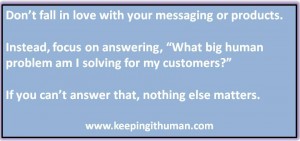The Big Marketing Question Your Company Must Nail
It’s a comical scene right out of one of my favorite new shows, Silicon Valley, where I grew up (of course, it was mostly cherry and apricot orchards then, but hey…). The scene: brilliant technical founders of a company that can tell you all about their technology down to excruciating and often mind-numbing minutiae. Yet, they can’t tell you in one or two clear and compelling sentences what big human problem their “solution” solves for customers. In episode 4 of Silicon Valley, one of the developers, Dinesh, bluntly says to a befuddled nerdy Richard, the creator of the compression algorithm and company’s founder, “You turned down $10 million to develop something that you can’t even describe to another human being!”
And, in an earlier episode, Erlich, the quirky, pot-smoking adviser, goes on a vision “quest” to find a better name for the company than Richard’s “Pied Piper.” During a drug-infused meditation, he starts spewing out vapid, jargon-filled names that include buzzwords such as “collaboration,” “cloud,” and “cross-platform,” until he finally shouts in defeat, “It’s all just f…..g meaningless words!” Comically, Erlich ends his rant exhausted and says, “making the world a better place” before he passes out.
There’s truth in comedy. Boom. There it is: too many meaningless words that don’t say anything. That unfortunately is a lot of the marketing out there today. We wonder why we have a deficit in trust. That’s due to a confluence of issues, among them way too much non-human messaging chasing a paucity of meaning.
This happens all the time – and not just in tech. I had three of these same conversations in just the past week alone where execs gush about every detail of their products. Yet, these same execs cannot tell you clearly and cogently how their products solve big problems and leave customers better off. It’s the most important question you must answer in your marketing – What human problem are you solving for customers that leaves them better off both personally and professionally?
Moreover, your products and services will change and so will customers’ needs. If you don’t track their needs, you cannot create meaningful offerings or communications.
Don’t Marry Your Products and Services – Just Take ‘Em Out for a Few Drinks
Companies fall way too much in love with their products and services – even their company and product names – and not enough in love with understanding customers’ big needs. And you have to find the right BIG problem to solve. Far too many “offerings” don’t map to real customer challenges. That’s a huge problem for your credibility, differentiation and longevity.
And, if you can’t articulate how you fix a problem the customer agrees he or she has, you’ll lose to the toughest competitor of all: the status quo. I recently saw one company, for example, tout that they solve the big problem of excel cycle time. Really? Because here is the issue – their ideal customers don’t see this as their big problem. That means there is no incentive to change what they are doing. A corollary to answering what problem you solve is solving the RIGHT problem – the big hairy one your customers know and agree that they have.
The Big Marketing Question: How the Hell Will You Make My Life Better?
Yes, there are other important questions your company needs to get right. This big marketing question goes to the heart of why a company or product exists in the first place. It’s not about your products and services; so quit drowning people in them.
When people ask what your company does (or even your personal brand – yes the same is true here, too), they are really asking what problem do you solve?
More than that: In human speak – people are hungry to know the answer to the following, “How the hell will your stuff make my life better?” If I don’t see a reduction of time using excel by 50% as a life-changing event, for example, your message on reduced cycle time misses the mark. What’s the personal, human need here? If your product actually helps me get promoted by increasing my credibility and visibility – there you go. THAT is a big human need filled.You have to dig deep to understand what human problem you are really solving. It may not be obvious at first and it takes work to excavate. The rewards are worth it.
Don’t fall in love with any of it. Fall in deep like if you want; just make sure you fall in love with the idea of how you make customers’ lives better, so you can clearly communicate it.
If you can’t clearly tell me how you leave customers better off, then how is any of your marketing going to be credible? How can you possibly build great customer relationships?
And, as Erlich demonstrated so well, if you can’t articulate it clearly, how can you make the world a better place?
So how do you answer the big marketing question?



